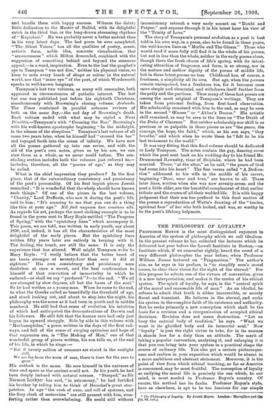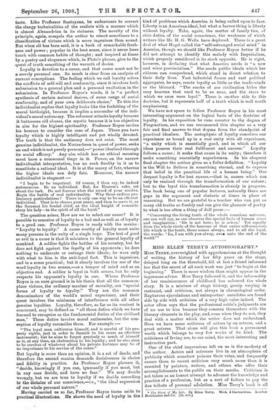THE PHILOSOPHY OF LOY.A.LTY.*
PROFESSOR ROYCE is the most distinguished exponent in America of the system of philosophy which we call idealism. In the present volume he has collected the lectures which he delivered last year before the Lowell Institute in Boston,—an Institute which, if we remember rightly, heard the creed of a very different philosopher the year before, when Professor William James lectured on "Pragmatism." The author's aim, as he says in his preface, is "to simplify men's moral issues, to clear their vision for the sight of the eternal." For this purpose he selects one of the virtues of convention, gives it a new interpretation, and makes it the centre of his ethical system. The spirit of loyalty, he says, is the "central spirit of the moral and reasonable life of man." As an idealist, he refuses to admit that truth is either inaccessible, or merely fluent and transient. He believes in the eternal, and seeks his system in the complete faith of its existence and authority. But he seeks primarily a new conception which shall be the basis for a revision and a reorganisation of accepted ethical doctrines. Revision does not mean destruction. "Let us bury the natural body of tradition," he says. "What we want is its glorified body and its immortal soul." Now "loyalty" is just the right virtue to take, for in its essence it stands less for a duty than an attitude. The merit of taking a popular convention, analysing it, and enlarging it is that you can bring into your system in a practical shape the cruces of ordinary life. You also get a certain picturesque- ness and realism in your exposition which would be absent in a more ambitious and abstract statement. Moreover, it is the point of view from which ethical teaching, so far as America is concerned, may be most fruitful. The conception of loyalty as unifying the moral life is precisely the one which, to our mind, is most needed in Professor Royce's country. Of course, the method has its faults. Professor Royce's style, here as elsewhere, is apt to be too luscious for our simple * The Philosophy of .Loyaity. Xsy Josiah. #oyce. London : Tdacrnillan and Rs. 6d. net.]
taste. Like Professor Santayana, he endeavours to correct the slangy technicalities of the realists with a manner which is almost Alexandrian in its richness. The novelty of the principle, again, compels the author to resort sometimes to a Classification of virtues which is more ingenious than sound. But when all has been said, it is a book of remarkable fresh- ness and power ; popular in the best sense, since it never loses touch with common habits of thought ; and inspired at times by a poetry and eloquence which, in Plato's phrase, give to the quest of truth something of the warmth of desire.
Loyalty is devotion to a cause, and that cause must not be a merely personal one. So much is clear from an analysis of current conceptions. The feeling which we call loyalty solves the conflicts of self-will and conformity, since it involves both submission to a general plan and a personal exaltation in the Submission. In Professor Royce's words, it is " a. perfect synthesis of certain natural desires, of some range of social Conformity, and of your own deliberate choice." To this the individualist replies that loyalty looks like the forfeiting of the moral birthright, because it implies a surrender of the indi- vidual's moral autonomy. The reformer attacks loyalty because it buttresses old abuses, the mystic because it is too objective in aim for the highest spirituality. Professor Royce invites his hearers to consider the case of Japan. There you have loyalty which is highly intelligent and yet wholly devoted.
The truth is that the antinomy does not exist. The most genuine individualist, the Nietzscbean in quest of power, seeks an end which is not purely personal,—" power idealised through its social efficacy." Any aim which has an ethical meaning must have a communal tinge in it. Power, on the narrow individualist interpretation, has no such finality in it as to Constitute a rational ideal. It is at the mercy of fate, whereas the higher ideals can defy fate. Moreover, the narrow individualist is stagnant :—
"I begin to be impatient. Of course, I then say, be indeed autonomous. Be an individual. But, for Heaven's sake, set about the task. Do not forever whet the sword of your resolve. Begin the battle of real individuality. Why these endless pre- liminary gesticulations ? There is only one way to be an efficient individual. That is to choose your cause, and then to servo it, as the Samurai his feudal chief, as the ideal knight of romantic Story his lady—in the spirit of all the loyal."
The question arises, How are we to select our cause ? It is possible to conceive of loyalty to a bad end as well as of loyalty
to a good one. Professor Royce is ready with the maxim : "Loyalty to loyalty." A cause worthy of loyalty must unite many persons in the unity of a single hope. The test of good or evil in a cause is that it ministers to the general loyalty of mankind. A soldier fights the battles of his country, but he does not fight against the loyalty of his opponents ; he does nothing to underrate or outrage their ideals; be wars only with what to him is the anti-loyal fact. This is ingenious,
and in a sense practical ; but it clearly involves the use of the word loyalty in two senses,—as a temper of mind and as an objective end. A soldier is loyal in both senses, but he only
respects his opponent's loyalty in one. Where Professor Royce is on sure ground is in his thesis that all the common- place virtues, the ordinary maxims of morality, are "special forms of loyalty to loyalty." They are the common denominators of the world's moral experience, and their quest involves the minimum of interference with all other genuine loyalties. Loyalty, therefore, so far as its content is
concerned, may be defined as " all those duties which we have learned to recognise as the fundamental duties of the civilised man." These duties involve moral antinomies, but the con- ception of loyalty reconciles them. For example :— " The loyal man cultivates himself, and is careful of his pro- perty rights, just in order to furnish to his cause an effective instrument; but he aims to forget precisely so much of himself as is, at any time, an obstruction to his loyalty ; and he also aims to be careless of whatever about his private fortunes may be of ho importance to his service of the cause."
But loyalty is more than an opinion, it is a set of deeds, and therefore the second maxim demands decisiveness in choice
and fidelity in practice. As Professor Royce phrases it, "decide, knowingly if you can, ignorantly if you must, but
in any case decide, and have no fear." We may decide wrongly, but we are true to loyalty if we decide according
to the dictates of our conscience,—i.e.," the ideal expression
of our whole personal nature."
Having carried us so far, Professor Royce turns aside to
practical illustrations. He shows the need of loyalty in the kind of problems which America is being called upon to face. Liberty is an American ideal, but what a barren thing is liberty without loyalty. Take, again, the matter of family ties, of civic duties, of the social Conscience, the weakness of which writers like Mr. H. G. Wells have deplored. There is a great deal of what Hegel called the "self-estranged social mind" in
America, though we should like Professor Royce better if he did not attempt to identify this malady with Imperialism, which properly considered is its stark opposite. He is right, however, in declaring that what America needs is "a new and wiser provincialism." She needs public ideals which her
citizens can comprehend, which stand in direct relation to their daily lives. Vast industrial forces and vast political aggregates, he says, create loyalty as little as the trade-winds
or the blizzard. " The smoke of our civilisation hides the very heavens that used to be so near, and the stars to which we once were loyal." There is another side to this doctrine, but it represents half of a truth which is well worth emphasising.
We have not space to follow Professor Royce in his most interesting argument on the logical basis of the doctrine of loyalty. In his exposition he runs counter to the dogma of Pragmatism, and we can recommend this chapter as a very fair and final answer to that dogma from the standpoint of practical idealism. The metaphysic of loyalty conceives our experience as bound up in a real unity with all experience, "a unity which is essentially good, and in which all our ideas possess their real fulfilment and success." Loyalty follows a cause ; it seeks that cause in its unity; therefore it seeks something essentially superhuman. In his eloquent final chapter the author gives us a fuller definition. " Loyalty is the Will to Believe in something eternal, and to express that belief in the practical life of a human being." Our deepest loyalty is for lost causes,—that is, causes which can only be realised through the transformation of our nature ; but to the loyal this transformation is already in progress.
The book being one of popular lectures, naturally there are gaps in the argument and rhetoric at times in place of reasoning. But we are grateful to a teacher who can put so many old truths so freshly and can give the glamour of poetry to what is too often a thing of dull prose :—
" Concerning the living truth of the whole conscious universe, one can well say, as one observes the special facts of human souse and imagination : 'He is not here; he is arisen.' Yet equally from the whole circle of the heavens of that entire self-conscious life which is the truth, there comes always, and to all the loyal, the words: Lo, I am with you alway, even unto the end of the world.'"











































 Previous page
Previous page